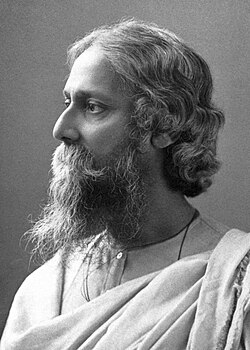| Bengali literature বাংলা সাহিত্য | |
|---|---|
(clockwise from top to bottom :) The oldest bengali script 'The charyapada' (top), Kazi Nazrul Islam (Bottom right), Rabindranath Tagore (Bottom left). | |
| Bengali literature | |
| By category Bengali language | |
| Bengali language authors | |
| Chronological list – Alphabetic List | |
| Bengali writers | |
| Writers – Novelists – Poets | |
| Forms | |
| Novel – Poetry – Science Fiction | |
| Institutions and awards | |
| Literary Institutions Literary Prizes | |
| Related Portals Literature Portal Bangladesh Portal | |
This article needs additional citations for verification .(July 2020) |
This article provides an alphabetical list of Bengali language authors. For a chronological list, see List of Bengali language authors.

